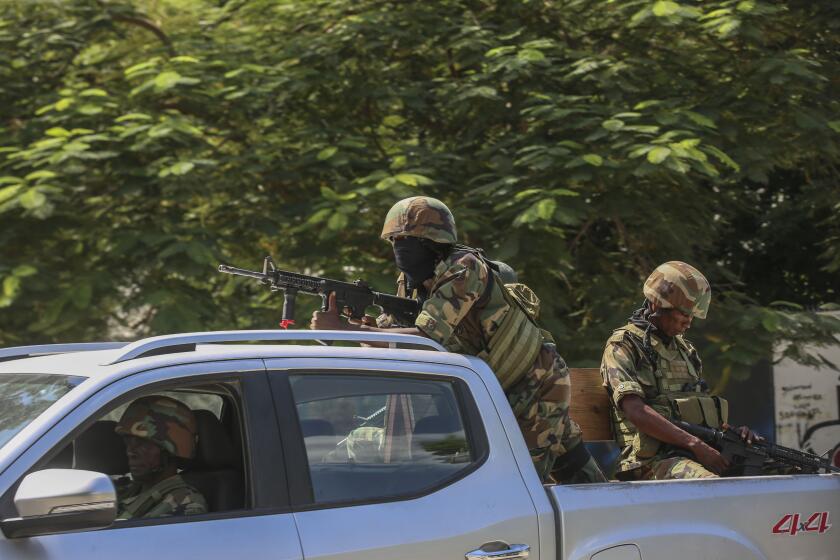FAA prohibits U.S. airlines from flying to Haiti after Spirit Airlines plane was shot by gangs

- Share via
PORT-AU-PRINCE, Haiti — The Federal Aviation Administration announced Tuesday that it will prohibit U.S. airlines from flying to Haiti for 30 days after gangs shot a Spirit Airlines flight; the United Nations also said it will suspend flights, “obviously limiting the flow of humanitarian aid and humanitarian personnel into the country.”
The bullets hit the plane when it was about to land Monday in the country’s capital Port-au-Prince, injuring a flight attendant. It was part of a wave of violence that erupted in Haiti as the country swore in its new prime minister after a politically tumultuous process.
Life in much of Haiti’s capital was frozen after the wave of violence, which came to a head when gangs shot a Spirit Airlines airplane Monday, forcing the airport to shut down. Photos and videos obtained by the Associated Press show bullet holes dotting the interior of a plane. A number of airlines suspended flights to Haiti through Thursday, but it was unclear how long closures could drag on.
Neither the former interim prime minister, Garry Conille, nor the newly inaugurated Alix Didier Fils-Aimé commented on the violence.
But Luis Abinader, who as president of the neighboring Dominican Republic has cracked down on Haitian migration, called firing on the airplane terrorism.
The airport shut down after gangs opened fire at a Spirit Airlines flight landing in Port-Au-Prince, the U.S. State Department and the airline said.
“This was a terrorist act; the countries that are following and helping Haiti should declare these armed gangs as terrorist groups,” Abinader said in a news conference.
On Tuesday, heavily armed police in armored cars outside the airport checked trucks used for public transportation passing by.
Schools were closed, as were banks and government offices. Streets, where just a day before gangs and police were locked in a fierce firefight, were eerily empty, with few driving by other than a motorcycle with a man who had been shot clinging to the back.
The sounds of heavy gunfire still echoed through the streets in the afternoon — a reminder that despite political maneuvering by Haiti’s elites and a strong push by the international community to restore peace, the country’s toxic slate of gangs kept its firm hold on much of the Caribbean nation.
The United Nations estimates that gangs control 85% of the capital, Port-au-Prince. A U.N.-backed mission led by Kenyan police to quell gang violence struggles with a lack of funding and personnel, prompting calls for a U.N. peacekeeping mission.
Prime Minister Garry Conille held an emergency meeting Monday to talk about the attacks in Solino and other neighborhoods.
The violence comes after a transitional council, tasked with restoring democratic order to Haiti, which hasn’t held elections since 2016, decided to fire Conille, who often was at odds with the council during his six months in office. The council rapidly swore in businessman Fils-Aimé as the new interim prime minister.
Conille originally called the move illegal, but on Tuesday acknowledged Fils-Aimé’s appointment in a post on the social media platform X.
“[I] wish him success in fulfilling this mission. At this crucial moment, unity and solidarity are essential for our country. Long live Haiti!” he wrote.
Fils-Aimé promised to work with international partners to restore peace and hold long-awaited elections, a vow also made by his predecessor.
But many Haitians, like 43-year-old Martha Jean-Pierre, have little taste for the political fighting, which experts say only give gangs more freedom to continue expanding their control as Haiti teeters on the brink of famine.
A transitional council was established in April, tasked with choosing Haiti’s next prime minister and Cabinet with the aim it would quell turmoil.
Jean-Pierre was among those to brave the streets of Port-au-Prince on Tuesday to sell the plantains, carrots, cabbage and potatoes she carried in a basket on her head. She had no choice, she said — selling was the only way she could feed her children.
“What good is a new prime minister if there’s no security, if I can’t move freely and sell my goods,” she said, nodding to her basket of vegetables. “This is my bank account, this is what my family depend on.”
It was a frustration that appeared to be international players that have pushed for a peaceful resolution in Haiti like the U.N. and the U.S.
On Tuesday, the U.S. State Department lamented that Conille and the council “were unable to move forward in a constructive manner” and called on Fils-Aimé and the council to provide a clear action plan outlining a joint vision on how to decrease violence and pave the path for elections to be held to “prevent further gridlock.”
“The acute and immediate needs of the Haitian people mandate that the transitional government prioritize governance over the competing personal interests of political actors,” it wrote in a statement.
Sanon writes for the Associated Press. Associated Press video journalist Pierre-Richard Luxama contributed to this report.
More to Read
Sign up for Essential California
The most important California stories and recommendations in your inbox every morning.
You may occasionally receive promotional content from the Los Angeles Times.













